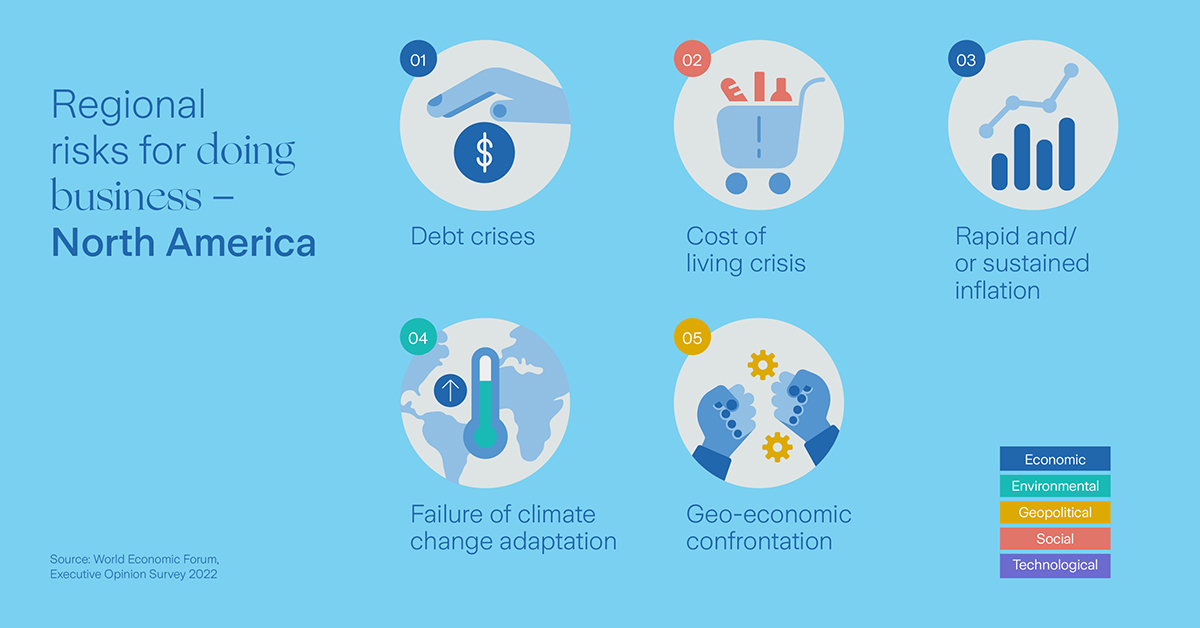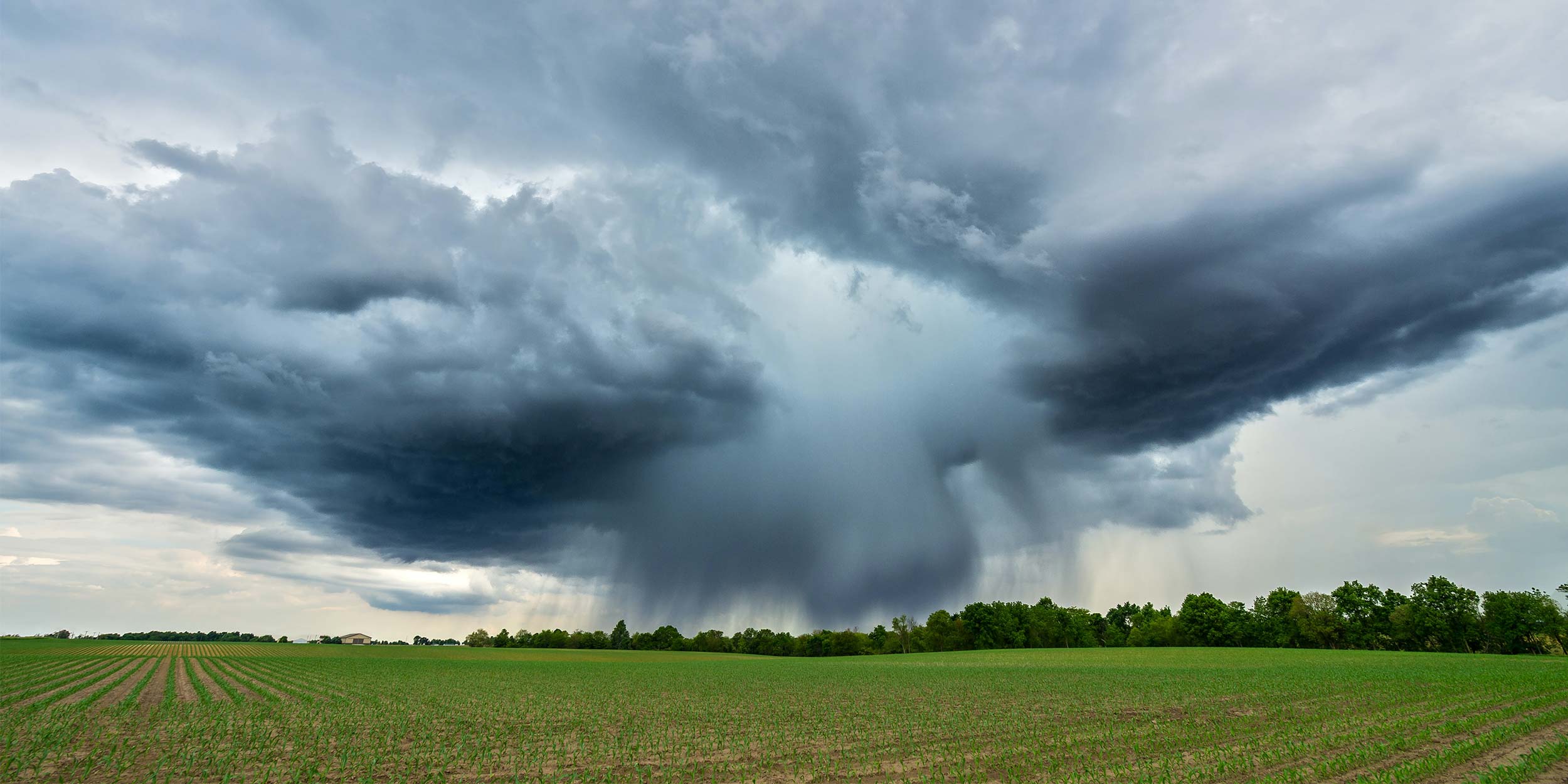Economic woes are top of mind for business leaders in U.S. and Canada, survey reveals
Global risksArticleNovember 7, 2022
Concerns about inflation, debt crises, climate change and global conflicts rose to the top in North America and throughout the world in the latest World Economic Forum Executive Opinion Survey.
Timing is everything. After months of rising costs for goods and services and with no end in sight, business leaders in North America cited inflation as one of the top concerns in the next two years, according to the results of the recent World Economic Forum’s Executive Opinion Survey 2022.
“Rapid and/or sustained inflation” was named the no. 2 risk among business leaders in the United States and the no. 3 risk in Canada. Executives also cited “debt crises” among the top risks in the U.S. (no. 1) and Canada (no. 2).

Inflation and debt crises were just two of several economic concerns on the minds of business leaders—a stark contrast from the results of the last survey in 2020, when cyber attacks and the spread of infectious diseases were the top two risks in the U.S. and Canada.
The survey, conducted by the World Economic Forum’s Centre for the New Economy and Society, asked more than 12,000 business leaders around the world to select, from a list of 35 global risks, “which five risks are the most likely to pose the biggest threat to your country in the next two years?” The risks were divided into five categories: economic, environmental, geopolitical, societal, technological.
While the survey highlights some obvious concerns, it also sheds light on other risks that are keeping executives up at night.
In the U.S., the top five risks identified by business leaders are: 1) debt crises; 2) rapid and/or sustained inflation; 3) geo-economic confrontation; 4) failure of climate-change adaption; 5) interstate conflict (tie) and employment and livelihood crises (tie).
In Canada, the top five risks identified by business leaders are: 1) cost of living crisis; 2) debt crises; 3) rapid and/or sustained inflation; 4) failure of climate-change adaption; 5) asset bubble burst.
In addition to the economic concerns, it is noteworthy that business leaders in North America have begun to recognize that climate change is an existential threat—not only to their businesses, but to their communities. At a time when the world is still reeling from the social and economic impacts of a global pandemic and war rages in Europe, “failure of climate-change adaption” was the no. 4 risk in both the U.S. and Canada.
Helping customers manage risk
As a leader in helping companies manage their risks, Zurich is keenly aware of what can happen if, collectively, we don’t adapt to climate change and fail to address the various threats highlighted in the WEF survey.
In addition to economic inflation, supply chain issues, a challenging labor market, climate-related exposures and social inflation will continue to shape the property & casualty insurance landscape in 2023. In the year ahead, insurance providers and their customers will also operate in a geopolitical landscape that will remain unstable, in large part because of the war in Ukraine.
Given all these challenges, it can be difficult to remain optimistic about businesses and the insurance providers who help to manage their risks. But all is not bleak in the world of risk.
The insurance industry, and Zurich in particular, are well positioned to weather the stormy mix of physical and economic risks in 2023 and beyond. In fact, the insurance industry can—and should—lead the charge for climate resilience and operational resilience and raise awareness about the impacts of economic and social inflation. It’s not only in our own best interest, but also in the interest of our customers and other business leaders, who have highlighted the key challenges in the WEF survey.
Inflation: Economic and Social
The economic inflation that most consumers can identify is very different from the “social inflation” that affects all of us indirectly. Economic inflation is felt from the grocery shelf to the gas pump to the airways and across all income levels. Social inflation directly impacts business operations and the cost of insurance in terms of a value change and exposure change.
Social inflation is one of the driving causes of exceptionally high jury awards that go beyond what should be a reasonable or rational amount. Four major factors define social inflation: litigation funding; the erosion of tort reform; negative public sentiment toward larger businesses; and desensitization to large jury awards.
That’s why Zurich North America is working with others throughout the insurance industry to build a coalition to enact legislation at the state level to address tort reform. It’s time to fight back, because when jury awards get out of hand, everybody pays.
Climate resilience
Zurich and its customers are up against more than just a litigious climate—we’re facing a world in which climate change is shaping the very nature of risk.
The ferocity of Hurricane Ian in Florida is a stark reminder that the tropical storms we’re experiencing today are more powerful and more destructive than those we saw decades ago. Scientists believe that the warming of the atmosphere and the oceans is the main reason for the increased severity of these storms.
It’s not just hurricanes. In the past five years, we’ve experienced record-breaking droughts and wildfires in the West, destructive hailstorms, 500-year floods and, in Texas, a deep freeze that knocked out the power grid and caused billions in insured losses.
At Zurich, we’ve made great strides in addressing our own carbon footprint and other measures to align our business activities with the Paris Agreement’s target of limiting temperature increase to 1.5 degrees Celsius.
We are expanding our efforts to help our customers manage the emerging risk of climate change and support their transition to a net-zero society through the use of our insurance products and services. Managing climate risk is not just the right thing to do—research shows $1 spent in prevention saves $5 in future losses.
With all the challenges that lie ahead, I am confident that Zurich will remain resilient and continue to help its customers build resilience and thrive. We’ve been in business more than 150 years—including more than 110 years in the United States. We plan to be here for our customers for another 150 years, at least.



